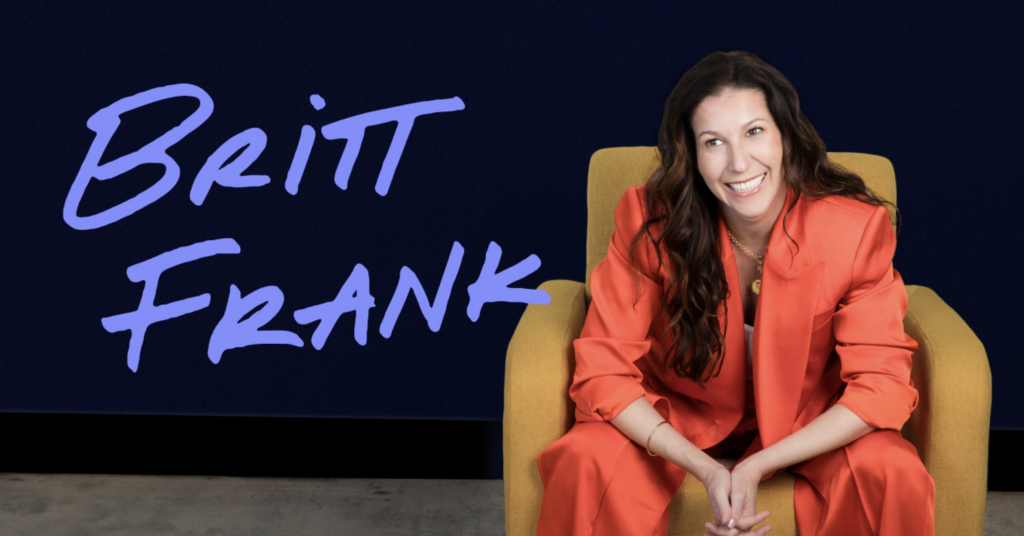Ever had a full argument with yourself in your head? Has society ever made you feel crazy for it? What if instead of feeling weird about the whole thing, you used it as a super power? Maybe you already do, but you’re looking for an outside agent to give you permission.
This is just one of the things that Britt Frank aims to de-stigmatize in her upcoming book Align Your Mind. Frank is a local licensed neuropsychotherapist, keynote speaker, author, and past Pitch columnist—focusing on how to turn depression and fear into inspiration, creative or functional or otherwise.
Instead of perpetuating the negative stigma around entertaining the influx of voices in our heads, she works to give us the tools to work with them and use our multifaceted brains to our ability. In a Q&A ahead of Align Your Mind‘s release this May, we used the opportunity to talk about what self-talk, fear, and *gestures* the state of everything is doing to us on the inside—and how to take that power back.
What was the plan for your latest book, Align Your Mind?
Britt Frank: The bulk of the book is based on a model of psychotherapy that I’m trained in called Internal Family Systems (IFS), and it is based on the idea that our minds, just like our bodies, are made of different parts. We treat our minds like it’s this scary haunted house that we don’t want to go in alone; so we drink, we scroll, we procrastinate. But if you understand that your mind is made up of different parts, like different characters in a movie, then it all starts to make more sense.
What was the inspiration?
I wrote Align Your Mind to make that model easy to access for a general audience. Even for someone who has no interest in therapy and no trauma or anxiety, it’s still going to be relevant. We talk about hearing our thoughts, but most people don’t think, “Well, you’re hearing thoughts, but you know, you can talk to them too!”
And they say, “Oh, are you saying I have multiple personality disorder?” And the answer is no: it’s not a disorder to have multiple personalities. We just treat it like that because of the media and movies. We’re like, “This is weird. I’m talking to myself.” But how often have any of us said, “Part of me knows I should be going to the gym, but this other part of me wants to sit on the couch and binge-watch Yellowstone.”
That was me yesterday.
The media historically has been very weird about it, having conversations in your head that is. I’m just like, “Well, is it?” I don’t think it is. It shouldn’t be.
Yeah. If you’re hearing voices that tell you to hurt yourself, yes, go to a doctor, that’s not what I’m talking about. I’m talking about a different way to think about our thinking, and that when you’re talking to yourself, who’s talking and who’s listening? Because if you realize that there’s a whole bunch of different people in your head, it makes sense why you feel torn between two decisions, or why you can love your family on one day, but after Thanksgiving dinner, you want to run away and never talk to them again. It’s because we all have these different aspects of ourselves. I wrote Align Your Mind because after more than a decade of practicing therapy, I’m sad that people think they have to fight themselves. But what if we didn’t have to fight ourselves? What if we could actually have a peaceful relationship with our mind instead of battling it out?
Absolutely. Was there something that you personally experienced that, like, ignited wanting to write this book, or is it more your work in therapy that slowly inspired it?
Yeah. The broad umbrella of IFS is called parts work, which is that your mind is made of parts, and here are the different ways to work with it. I’ve been a huge fan of this work since even before I became a therapist. And my first book, The Science of Stuck, came out in 2022 and in it I gave a broad overview of all different types of therapy. There was a chapter in that book about parts work, and I knew my second book needed to be a deep dive, because I’ve never seen anything make people feel better as fast as parts work.
Do you think you’re going to keep writing books about different types of therapies? What do you anticipate writing in the future?
I’ve released three books in three years. I’m taking a break. I love writing, and I would love to write more books, but I need to take a minute because all of my multiple personalities in my brain are all tired.
I would be exhausted too!
But I do a lot of keynote speaking, which I really love, because it allows me to talk to lots of people. I love doing therapy, but one on one, there’s only so much time and energy you have. But with keynote speaking, I get to bring the message to a really broad audience, which makes me happy, because we don’t have to suffer. We don’t have to be miserable all of the time.
Do you have specific speaking topics that are related to your new book? Is this something you have done with your past work?
My passion is to demystify all these therapies. You know, people are sort of talking and therapy speak now as a trend. It’s all feelings, trauma, and triggers and can be just as unhelpful as never talking about it. So I really love making the science simple so people can have practical tools. I do a keynote on leadership for both how to lead yourself and all of the different parts of you to lead other people. I also have a keynote on peak performance, because whether or not you’re an Everest climber or an ultra marathon runner, everyone wants to feel like they’re doing the best version of themselves most days…I also offer workshops, because my second book was a workbook.
I was reading through your website, and it says that you used to be a hot mess. Been there. I want to know a little bit more about your journey from being in that state to where you are now, where you’re conquering multiple industries. You’re conquering being an author, you’re actively working in therapy, you’re doing keynote speaking. How’d you get here?
Like many people in the wellness world, I came to the works for my own trauma healing journey. So I have a fairly extensive trauma history and a very long list of mental health diagnoses that I was told I would suffer from for my entire life. And so I just thought, this is just who I am. I’m just somebody who’s broken, and there’s nothing I can do to change it. I was a drug addict, and I had eating disorders. I have OCD. I self-identify as neurodivergent.”
“I came to this work because I wanted to figure out what I am missing. I felt like I was sent out of the human factory with parts missing and pieces missing and no operating handbook. So when I learned the things that I now practice and write about and teach, it made things click into place… I didn’t know that brains could change. I didn’t know that my personality wasn’t just normal or disordered… It took me a while. I was stubborn. I didn’t want to do it, and so I, like most people, did a few things and moved forward, and then took myself back… I was horrified to discover how simple some of the tools were.
What do you want people to anticipate with Align Your Mind, and what do you hope people leave with after reading it?
The broader thing I hope people realize is that 40 million of us are diagnosed, and I say us because it’s me too, 40 million of us are diagnosed with anxiety-related mental health issues, and that’s 20% of the population. I couldn’t help but wonder, is it that all of us are just mentally ill? And again, I take psych meds, I see a therapist; I’m not in any way stigmatizing mental health. However, are all of us mentally ill, or is it possible that there’s something else going on? Is it possible that there’s information that we don’t have that would make our struggles more manageable?
We don’t need to keep diagnosing ourselves and think that the problem is us. We live in a world that our brains were never designed to be able to handle. My hope for the book are one that people realize that there are simple tools that they can use to make their lives like the external might not get easier, but they will feel less overwhelmed by their life when they have different information to manage it, and second, that we don’t have to fight or fear our own minds. Once you get to know who’s inside there, and you start talking to them and listening, you realize that you’re never really alone. You’ve got good company all of the time, even the parts of ourselves that we think are so terrible.
Align Your Mind will be released on May 13 and is currently available for pre-order at Barnes & Noble, Amazon, and other retailers. Her website provides more information on her practice.
Tags: adhd, align your mind, Britt Frank, Depression, IFS, internal family systems, keynote, mental health, ocd, parts work, PTSD, the science of stuck, therapist, Therapy


